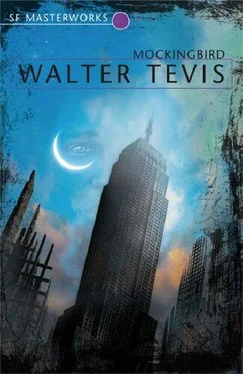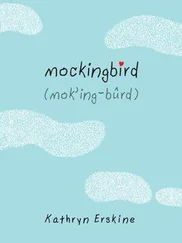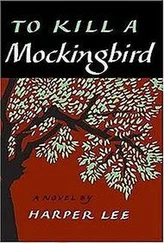Spofforth said nothing. Something in him was drawn toward the old man—some tiny hint of kinship. But he had no feelings about the young humans who were being trained and acculturated in this place.
He had no conscious feelings about them, of the usually vacant-eyed, slow-moving, and silent groups of them, going quietly from class to class or sitting alone in the Privacy rooms smoking dope and watching abstract patterns on their wall-sized television sets and listening to mindless, hypnotic music from speakers. But in his mind there was almost always the image of one; the girl in the red coat. She had worn that ancient coat all winter and still wore it on spring nights. It was not the only thing different about her. There was sometimes a look on her face, flirtatious, narcissistic, vain, that was different from the rest of them. They were all told to develop themselves “individually” but they all looked the same and acted the same, with their quiet voices and their expressionless faces. She swung her hips when she walked, and sometimes she laughed, loudly, when everyone else was quiet, absorbed in herself. Her skin was as white as milk and her hair coal black.
Spofforth thought of her often. At times, seeing her on her way to a class, surrounded by others but alone, he wanted to walk over to her and touch her gently, just place his big hand on her shoulder and hold it there for a while, feeling the warmth of it. Sometimes it seemed to him that she was watching him from beneath lowered eyes, amused, laughing at him. But they never spoke.
“Hell,” Arthur was saying. “You robots’ll be running everything in another thirty years. People can’t do shit for themselves anymore.”
“I am being trained to run corporations,” Spofforth said.
Arthur looked at him sharply, and then he began to laugh. “By emptying ashtrays?” he said. “ Shit !” He began sweeping again, pushing the big broom vigorously down the Permoplastic floor. “Didn’t know you could fool a goddamn robot. And a Make Nine at that.”
Spofforth stood there holding the ashtrays for a minute, looking at him. No one is fooling me , he thought. I have my life to live .
It was a June night about a week after the conversation with Arthur that Spofforth was walking by the Audio-Visual Building under the moonlight and heard a rustling noise from behind the dense bushes that grew untended by the building. There was the groan of a male voice, and then more rustling.
Spofforth stopped and listened. Something was moving, more quietly now. He turned, walked a few steps until he was standing up against a tall bush and then pushed it quietly aside. And when, suddenly, he saw what was happening on the other side, he froze and just stood there, staring.
On her back, behind the bush, lay the girl, with her dress pulled up beyond her navel. A pinkish, naked, chubby young man was kneeling astride her; Spofforth could see a cluster of brown moles on the pink skin between his shoulder blades. He could see the girl’s pubic hair under the man’s thigh—curly hair, jet black against her pure white legs and white buttocks, as black as the hair on her head, as black as the little collar of the red coat on which she lay.
She saw him, and her face went grim with disgust. She spoke to him, for the first and last time ever. “Get out of here, robot,” she said. “Fucking robot. Leave us alone.”
Spofforth, a hand clamped on bis cloned heart, turned and walked away. It was there he learned a thing he was to know for the rest of his long life; he did not really want to live. He had been cheated—horribly cheated—of a real, human life; something in him rebelled against living the life that had been thrust upon him.
He saw the girl again a few times. She avoided his eyes completely. Not out of shame, he knew, since there was no shame for them in sex. “Quick sex is best” was what they were taught, and they believed it and practiced it.
He was relieved to be transferred from the dormitory to a more responsible job deciding the distribution patterns of synthetic dairy products, in Akron. From there he was moved to the production of small automobiles, presiding over the making of the last few thousand private cars ever to be driven by a once car-infatuated population. When that ended he became Director of the Corporation that manufactured thought buses, the sturdy eight-passenger vehicles made for an ever-dwindling human population. Then he became Director of Population Control, being transferred to New York for this, working in an office on top of a thirty-two-story building, watching over the aging computers that kept a daily census and adjusted human fertility rates accordingly. It was a tiresome job, presiding over equipment that was forever breaking down, trying to find ways of repairing computers that no human any longer knew how to repair and that no robots had been programmed to understand. Eventually he was given another job: Dean of Faculties at New York University. The computer that had served to direct that institution had ceased functioning; it became Spofforth’s job, as a Make Nine, to replace it and to make the mostly minor choices that running a university required.
There had been, he came to find out, a hundred Make Nines cloned, and animated with copies of the same original human mind. He was the last, and special adjustments were made in the synapses of his own particular metallic brain to prevent what had happened to the others of his series: they had been committing suicide. Some had fused their brains into black shapelessness with high-voltage welding equipment; some had swallowed corrosives. A few had gone completely insane before being destroyed by humans, freaking out madly, destructively, rampaging down city streets at midnight screaming obscenities. Using a real human brain as a model for a sophisticated robot had been an experiment. The experiment had been judged a failure, and no more were made. The factories still turned out moron robots, and a few Make Sevens and Make Eights, to take over from the humans more and more of the functions of government and education and medicine and law and planning and manufacturing; but all these had synthetic, nonhuman brains, without a flicker of emotion, of inwardness, of self-consciousness in them. They were merely machines—clever, human-looking, well-made machines—and they did what they were supposed to do.
Spofforth had been designed to live forever, and he had been designed to forget nothing. Those who made the design had not paused to consider what a life like that might be like.
The girl in the red coat grew old and fat and had sex with ten dozen men and had a few babies and drank too much beer and led a trivial, purposeless life and lost her beauty. And at the end of it she died and was buried and forgotten. And Spofforth went on, youthful, superbly healthy, beautiful, seeing her at seventeen long after she had forgotten, as a middle-aged woman, the sexy, flirtatious girl she had once been. He saw her and loved her and he wanted to die. And some heedless human engineer had even made that impossible for him.
The University Provost and the Dean of Studies were waiting for him when he returned from his June night alone.
The duller of the two was the provost. His name was Carpenter and he wore a brown Synlon suit and nearly worn-out sandals and his belly and flanks trembled visibly in the tight suit as he walked. He was standing near Spofforth’s big teakwood desk, smoking a joint, when the robot came in and walked briskly toward him. Carpenter stood nervously aside while Spofforth seated himself.
After a moment Spofforth looked at him—not just a bit to the right of him in the way that Mandatory Politeness required, but directly at him. “Good morning,” Spofforth said, in his strong, controlled voice. “Is something wrong?”
Читать дальше











